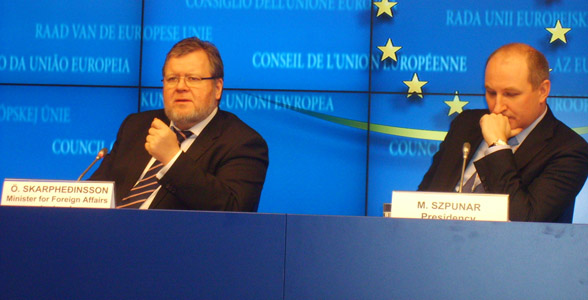Quarter of the chapters closed in Iceland's Accession negotiations with the EU
The third meeting of the Accession Conference between Iceland and the EU at Ministerial level took place earlier today in Brussels. The Icelandic delegation was led by Foreign Minister Össur Skarphéðinsson. Discussions took place on five chapters of the accession negotiations, four of which were provisionally closed. One third of all chapters have been opened since substantive negotiations began in late June of this year, or 11 of the 33 chapters. Eight chapters, or a quarter of all chapters, have also been provisionally closed.
In his opening remarks, the Minister welcomed the decision of the EU summit last week to strengthen the euro zone and overcome the debt burden of individual Member States. He said that measures taken to ensure the future of the euro were fundamentally important for Icelanders in choosing between an unstable krona with capital controls or a stable euro on a stronger footing than before. The Foreign Minister welcomed the good progress achieved in the accession negotiations thus far and urged for the early opening of more challenging chapters, such as fisheries, agriculture, regional policy and monetary policy.
Key issues at stake
The Minister highlighted the fact that chapters outside of the EEA Agreement were now on the agenda for the first time. This included chapter 23 on judiciary and fundamental rights, which was provisionally closed in light of Iceland's already close integration with EU legislation in the field. Iceland is also a party to the European Convention on Human Rights, along with other relevant international agreements. The Minister emphasised that the fight to ensure human rights is a priority issue and Iceland will continue to place itself alongside the EU and its member states in the promotion of human rights.
Minister Skarphedinsson said that when Iceland accedes to the Union, pending a national referendum, Iceland will propose that projects related to submarine cables, Northern shipping routes and infrastructure developments to establish Iceland as a telecommunications hub in the arctic region, would be eligible for EU funding. These projects would fall under Chapter 21 on Trans-European networks.
The Minister stated that Icelandic companies and businesses had benefited from the EU´s industrial and enterprise policy, as well as company law, through the EEA Agreement. It has strengthened the competitiveness of Icelandic companies, given them equal terms of access on the single market and increased foreign investments. This is especially important for small to medium sized firms, whose growth and success is key in order to create the 35,000 new jobs needed over the next decade.
Finally, the Minister recalled that although Iceland has achieved positive results in its economic recovery programme following the financial crash in autumn 2008, further efforts that call for caution and prudent public finance policies are still required. Therefore Iceland has requested a transitional period in its negotiation position to minimize as much as possible the burdens on state finances when it comes to accession.
The Conference participants included Maciej Szpunar, Under-Secretary of State on behalf of the Polish Presidency and Enlargement Commissioner Stefan Fule. The Danish representative also presented Denmark´s priorities for its Council Presidency in the first half of next year.
The next Accession Conference is expected to take place in Brussels in March 2012, where Stefán Haukur Jóhannesson, Iceland´s Chief Negotiator, will lead the Icelandic Delegation.

